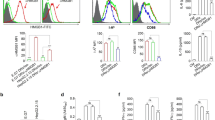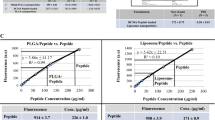Abstract
Induction of tumor-antigen-specific T cells in active cancer immunotherapy is generally difficult due to the very low anti-tumoral precursor cytotoxic T cells. By improving tumor-antigen uptake and presentation by dendritic cells (DCs), this problem can be overcome. Focusing on MAGE-A3 protein, frequently expressed in many types of tumors, we analyzed different DC-uptake routes after additional coating the recombinant MAGE-A3 protein with either a specific monoclonal antibody or an immune complex formulation. Opsonization of the protein with antibody resulted in increased DC-uptake compared to the uncoated rhMAGE-A3 protein. This was partly due to Fcγ receptor-dependent internalization. However, unspecific antigen internalization via macropinocytosis also played a role. When analyzing DC-uptake of MAGE-A3 antigen expressed in multiple myeloma cell line U266, pretreatment with proteasome inhibitor bortezomib resulted in increased apoptosis compared to γ-irradiation. Bortezomib-mediated immunogenic apoptosis, characterized by elevated surface expression of hsp90, triggered higher phagocytosis of U266 cells by DCs involving specific DC-derived receptors. We further investigated the impact of antigen delivery on T-cell priming. Induction of CD8+ T-cell response was favored by stimulating naïve T cells with either antibody-opsonized MAGE-A3 protein or with the bortezomib-pretreated U266 cells, indicating that receptor-mediated uptake favors cross-presentation of antigens. In contrast, CD4+ T cells were preferentially induced after stimulation with the uncoated protein or protein in the immune complex, both antigen formulations were preferentially internalized by DCs via macropinocytosis. In summary, receptor-mediated DC-uptake mechanisms favored the induction of CD8+ T cells, relevant for clinical anti-tumor response.






Similar content being viewed by others
References
Van den Eynde BJ, van der Bruggen P (1997) T cell defined tumor antigens. Curr Opin Immunol 9:684–693
Atanackovic D, Luetkens T, Hildebrandt Y, Arfsten J, Bartels K et al (2009) Longitudinal analysis and prognostic effect of cancer-testis antigen expression in multiple myeloma. Clin Cancer Res 15:1343–1352
Yang B, O’Herrin SM, Wu J, Reagan-Shaw S, Ma Y et al (2007) MAGE-A, mMage-b, and MAGE-C proteins form complexes with KAP1 and suppress p53-dependent apoptosis in MAGE-positive cell lines. Cancer Res 67:9954–9962
Laduron S, Deplus R, Zhou S, Kholmanskikh O, Godelaine D et al (2004) MAGE-A1 interacts with adaptor SKIP and the deacetylase HDAC1 to repress transcription. Nucleic Acids Res 32:4340–4350
Monte M, Simonatto M, Peche LY, Bublik DR, Gobessi S et al (2006) MAGE-A tumor antigens target p53 transactivation function through histone deacetylase recruitment and confer resistance to chemotherapeutic agents. Proc Natl Acad Sci USA 103:11160–11165
Marcar L, Maclaine NJ, Hupp TR, Meek DW (2010) Mage-A cancer/testis antigens inhibit p53 function by blocking its interaction with chromatin. Cancer Res 70:10362–10370
Atanackovic D, Altorki NK, Cao Y, Ritter E, Ferrara CA et al (2008) Booster vaccination of cancer patients with MAGE-A3 protein reveals long-term immunological memory or tolerance depending on priming. Proc Natl Acad Sci USA 105:1650–1655
Chaux P, Vantomme V, Coulie P, Boon T, van der Bruggen P (1998) Estimation of the frequencies of anti-MAGE-3 cytolytic T-lymphocyte precursors in blood from individuals without cancer. Int J Cancer 77:538–542
Brichard VG, Lejeune D (2007) GSK’s antigen-specific cancer immunotherapy programme: pilot results leading to Phase III clinical development. Vaccine 25(Suppl 2):B61–B71
Schnurr M, Chen Q, Shin A, Chen W, Toy T et al (2005) Tumor antigen processing and presentation depend critically on dendritic cell type and the mode of antigen delivery. Blood 105:2465–2472
Dhodapkar KM, Krasovsky J, Williamson B, Dhodapkar MV (2002) Antitumor monoclonal antibodies enhance cross-presentation of Cellular antigens and the generation of myeloma-specific killer T cells by dendritic cells. J Exp Med 195:125–133
Jeannin P, Jaillon S, Delneste Y (2008) Pattern recognition receptors in the immune response against dying cells. Curr Opin Immunol 20:530–537
Spisek R, Charalambous A, Mazumder A, Vesole DH, Jagannath S et al (2007) Bortezomib enhances dendritic cell (DC)-mediated induction of immunity to human myeloma via exposure of cell surface heat shock protein 90 on dying tumor cells: therapeutic implications. Blood 109:4839–4845
Jonuleit H, Kuhn U, Muller G, Steinbrink K, Paragnik L et al (1997) Pro-inflammatory cytokines and prostaglandins induce maturation of potent immunostimulatory dendritic cells under fetal calf serum-free conditions. Eur J Immunol 27:3135–3142
Thomas-Kaskel AK, Portugal TG, Herchenbach D, Houet LV, Finke HJ (2007) Allogeneic HLA-matched donor dendritic cells loaded with patient leukemic blasts preferentially induce CD4-positive leukemia-reactive donor lymphocytes. Acta Haematol pp 226–235
van der Bruggen P, Zhang Y, Chaux P, Stroobant V, Panichelli C et al (2002) Tumor-specific shared antigenic peptides recognized by human T cells. Immunol Rev 188:51–64
Consogno G, Manici S, Facchinetti V, Bachi A, Hammer J et al (2003) Identification of immunodominant regions among promiscuous HLA-DR-restricted CD4+ T-cell epitopes on the tumor antigen MAGE-3. Blood 101:1038–1044
Atanackovic D, Arfsten J, Cao Y, Gnjatic S, Schnieders F et al (2007) Cancer-testis antigens are commonly expressed in multiple myeloma and induce systemic immunity following allogeneic stem cell transplantation. Blood 109:1103–1112
Szmania S, Gnjatic S, Tricot G, Stone K, Zhan F et al (2007) Immunization with a recombinant MAGE-A3 protein after high-dose therapy for myeloma. J Immunother 30:847–854
Lambert SL, Okada CY, Levy R (2004) TCR vaccines against a murine T cell lymphoma: a primary role for antibodies of the IgG2c class in tumor protection. J Immunol 172:929–936
Nimmerjahn F, Ravetch JV (2008) Fcgamma receptors as regulators of immune responses. Nat Rev Immunol 8:34–47
Iida S, Kuni-Kamochi RMK, Misaka H, Inoue M et al (2009) Two mechanisms of the enhanced antibody-dependent cellular cytotoxicity (ADCC) efficacy of non-fucosylated therapeutic antibodies in human blood. BMC Cancer 9:58
Bevaart L, Jansen MJ, van Vugt MJ, Verbeek JS, van de Winkel JG et al (2006) The high-affinity IgG receptor, FcgammaRI, plays a central role in antibody therapy of experimental melanoma. Cancer Res 66:1261–1264
Basu S, Binder RJ, Ramalingam T, Srivastava PK (2001) CD91 is a common receptor for heat shock proteins gp96, hsp90, hsp70, and calreticulin. Immunity 14:303–313
Liu B, Dai J, Zheng H, Stoilova D, Sun S et al (2003) Cell surface expression of an endoplasmic reticulum resident heat shock protein gp96 triggers MyD88-dependent systemic autoimmune diseases. Proc Natl Acad Sci USA 100:15824–15829
Dai J, Liu B, Caudill MM, Zheng H, Qiao Y et al (2003) Cell surface expression of heat shock protein gp96 enhances cross-presentation of cellular antigens and the generation of tumor-specific T cell memory. Cancer Immun 3:1
di Pietro A, Tosti G, Ferrucci PF, Testori A (2009) Heat shock protein peptide complex 96-based vaccines in melanoma: How far we are, how far we can get. Hum Vaccin 5:727–737
Acknowledgments
We thank GlaxoSmithKline Vaccines, Rixensart, Belgium, for providing human recombinant MAGE-A3 protein. We thank Dr. Marie Follo for expert technical support with the Scan^R imaging system. This work was supported by a grant from the Deutsche Krebshilfe.
Conflict of interest
The authors declare no potential conflict of interest.
Author information
Authors and Affiliations
Corresponding author
Rights and permissions
About this article
Cite this article
Moeller, I., Spagnoli, G.C., Finke, J. et al. Uptake routes of tumor-antigen MAGE-A3 by dendritic cells determine priming of naïve T-cell subtypes. Cancer Immunol Immunother 61, 2079–2090 (2012). https://doi.org/10.1007/s00262-012-1272-y
Received:
Accepted:
Published:
Issue Date:
DOI: https://doi.org/10.1007/s00262-012-1272-y




